Path Spread
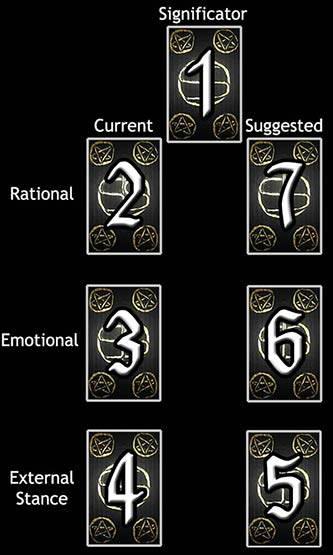
Difficulty: Easy
For the Path reading, one asks for suggestions how to behave properly to achieve a desired result. The Current column represents how the reader has been acting, and the Suggestedcolumn suggests how they should act to achieve a certain goal. The chart-like spread uses the standard three levels: Rational, Emotional, and External Stance (how one projects oneself outwardly). When comparing the Current and Suggested cards, the most important thing is to notice the differences between the two cards. It is these differences which hint at the behaviours that should be altered.
Card #1 is the significator, the card which should reflect the nature of the query and/or the desired outcome.
Card #2 shows the way the reader is and has been thinking. Card #7 suggests how to change the way one thinks to serve themselves better.
Card #3 suggests the reader's emotional attitude. Though it may seem difficult to manipulate one's own emotions, it can be done if one puts their mind to it. For example, acting a certain way such as smiling intently for a few minutes will lead the emotions to follow. When a person tries this, as silly as the exercise seems, they find this to evoke the emotion of happiness. For this reading, one should try to make themselves feel the way that Card #6 suggests.
External Stance means how one acts outwardly, how they hope others see them. Card #4 is about how the reader has been acting, while #5 indicates how they should act outwardly, for other people's sake. It is the differences between these cards that hint at what behaviour patterns should be altered.
Your Path Reading
| Current | The Significator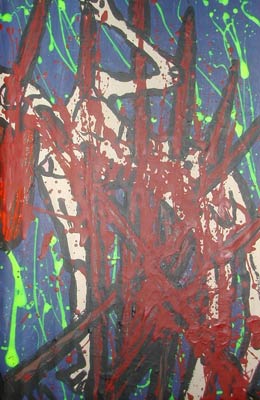 Eight of Stakes |
Suggested | |
| Thought | 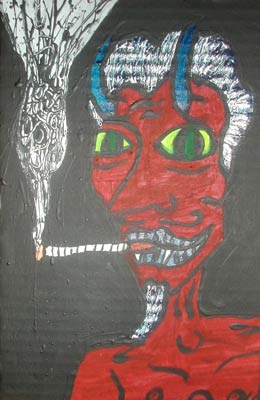 XV. The Devil |
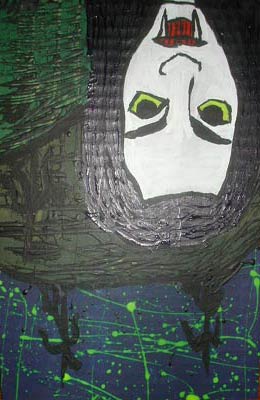 Queen of Stakes |
|
| Emotion | 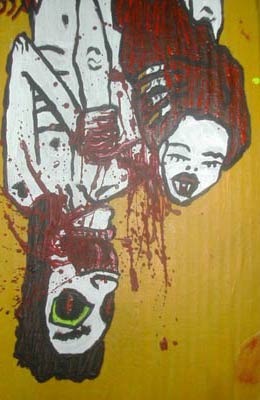 VI. The Lovers |
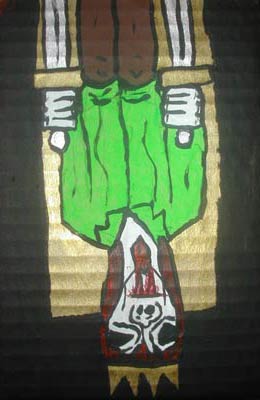 King of Swords |
|
| External Stance | 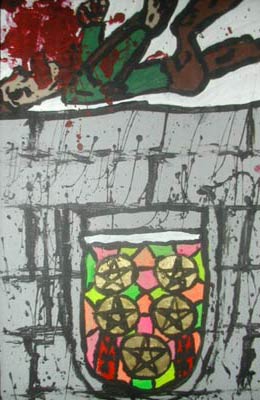 Five of Pentagrams |
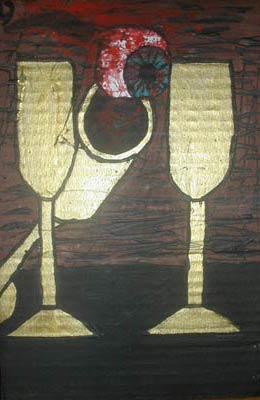 Three of Cups |

The Significator
Eight of Stakes
Symbolism:
A woman impaled by stakes showcases the cruel extremes of humanity. The stakes, angled as if in motion, represent swiftness and urgency. The scene hints at a world in constant flux, with events moving at an uncontrollable pace.
Meaning:
The Eight of Stakes represents rapid movement, action, and the culmination of efforts. It suggests that things are falling into place, and progress is accelerating toward your goals. This card encourages you to stay focused and prepared for opportunities that arise swiftly. It may also indicate travel, communication, or the arrival of significant news.
Keywords:
Upright: Speed, progress, opportunity, communication, movement, momentum.

Current Thoughts
XV. The Devil
Symbolism:
The Devil is portrayed as a towering, horned figure shrouded in shadow, with glowing crimson eyes and skeletal bat wings. Chains dangle from its outstretched hands, tethered to two figures who appear entranced rather than distressed, symbolizing voluntary bondage. A fiery pit burns at its feet, while the moon above is obscured by dark clouds, representing ignorance and illusion. Behind the Devil, a cracked mirror reflects hidden desires and fears.
Meaning:
The Devil signifies temptation, materialism, and self-imposed limitations. It highlights the darker aspects of human nature, such as obsession, addiction, or unhealthy attachments. This card often serves as a wake-up call to recognize and confront these influences, reclaiming your power and freedom.
Keywords:
Upright: Temptation, bondage, addiction, materialism, obsession, illusion, control.

Suggested Thoughts
Queen of Stakes
Reversed
Symbolism:
The Queen of Stakes stands proudly, her fangs bared in defiance. The impaled victims behind her serve as a stark reminder of her strength and resolve. She is both nurturing and fierce, embodying the duality of creation and destruction.
Meaning:
The Queen of Stakes symbolizes independence, confidence, and the ability to lead with compassion and strength. She encourages you to harness your inner power and remain true to yourself. This card often indicates success in business or personal endeavors.
Reversed, the Queen warns of jealousy, deceit, or opposition. It may also suggest a lack of self-confidence or struggles with balancing emotions.
Keywords:
Reversed: Jealousy, deceit, insecurity, opposition, imbalance.

Current Emotions
VI. The Lovers
Reversed
Symbolism:
The Lovers stand under a blood-red moon, their forms entwined yet distinct. One figure appears human, while the other is clearly vampiric, emphasizing the tension between attraction and duality. Between them, a single rose blooms, its petals tinged with crimson—a symbol of both love and sacrifice. In the background, a shadowy figure looms, hinting at the influence of external forces or choices yet to be made.
Meaning:
The Lovers symbolize connection, union, and the choices that shape our relationships and paths. This card often appears during moments of deep emotional connection or when a major decision requires alignment with your values and desires. It reminds you to consider the balance of give and take in relationships, whether romantic, platonic, or spiritual.
Reversed, this card warns of disharmony, imbalance, or misaligned priorities in relationships. It may also suggest indecision or a failure to honor your personal values.
Keywords:
Reversed: Disharmony, imbalance, misalignment, indecision, temptation, conflict.

Suggested Emotions
King of Swords
Reversed
Symbolism:
The King of Swords sits on his throne, holding two swords of justice crossed in front of him. His gaze is piercing and authoritative, reflecting a mastery of reason and balance. The environment around him is austere, emphasizing his focus on logic, law, and the pursuit of truth. His presence radiates power, intellect, and discipline.
Meaning:
The King of Swords symbolizes authority, rationality, and the power of thought. He embodies clarity, fair judgment, and leadership, urging you to approach situations with logic and integrity. This card often appears when strong leadership or impartiality is needed to resolve a conflict or make a critical decision.
Reversed, the King of Swords suggests abuse of power, cruelty, or arrogance. It may indicate someone who uses intellect or authority for selfish or harmful purposes. This card warns against being overly rigid, manipulative, or detached in your interactions.
Keywords:
Reversed: Abuse of power, arrogance, cruelty, manipulation, rigidity, dishonesty.

Current External Stance
Five of Pentagrams
Reversed
Symbolism:
Outside of the devil's church, a vampire lies in a heap of his own vomit, symbolizing excess, indulgence, and the consequences of material excess. The scene reflects the dangers of overindulgence and losing control.
Meaning:
The Five of Pentagrams represents material loss, poverty, and hardship. It signifies a time of struggle, where one may feel destitute or faced with overwhelming financial or personal challenges. It warns of consequences from reckless decisions and suggests that emotional support or help may be needed to overcome this period.
Reversed, it points to chaos, insecurity, and failed endeavors. It may indicate that the situation is worsened by your own actions or choices, leading to ruin, envy, or bad outcomes.
Keywords:
Reversed: Chaos, ruin, envy, insecurity, wasted opportunities.

Suggested External Stance
Three of Cups
Reversed
Symbolism:
Two overturned cups are washed clean, and a third toppled cup spills its all-seeing contents. The imagery suggests the end of a cycle, with emotions spilling over, marking a time for reflection, conclusion, and understanding.
Meaning:
The Three of Cups signifies celebration, community, and emotional fulfillment. It represents joyous reunions, friendship, and collective happiness. This card often points to success in group efforts or the enjoyment of time spent with loved ones, signaling an end to struggles and a period of peace.
Reversed, it points to excessive indulgence, gossip, or a disconnection from others. It warns of an unhealthy focus on physical pleasures over emotional well-being.
Keywords:
Reversed: Excess, gossip, overindulgence, disconnection, unhealthy focus.
